Are you an eCommerce enthusiast wondering about the latest Magento eCommerce trends?
Brace yourself, because I’m about to spill the beans on the hottest Magento eCommerce trends of 2024!
Get ready to explore a world where online shopping isn’t just a click, but an unforgettable experience.
From cutting-edge tech to customer-centric magic, this guide unveils the secrets that’ll transform your Magento eCommerce business.
So, whether you’re a tech enthusiast or a business buff, fasten your seatbelts – the Magento eCommerce trends are here, and it’s nothing short of extraordinary!
Let’s dive into the latest Magento eCommerce trends!
About Magento
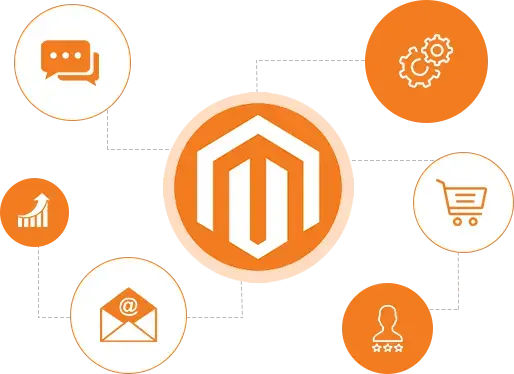
Magento is a leading open-source eCommerce platform, empowering businesses to create online stores tailored to their needs.
With its flexible architecture, robust features, and customizable options, Magento enables seamless product management, secure payment processing, and engaging shopping experiences.
Whether for small businesses or large enterprises, Magento offers a reliable and scalable solution for building successful online ventures.
And with the new Magento eCommerce trends, the platform has stepped up its game like never before!
Magento features and functionality
Magento offers a wide range of features, including:
- Catalog management: Magento makes it easy to create, manage, and update product catalogs of any size. Merchants can create custom product attributes, categories, and tags, and easily upload and manage product images and videos.
- Product management: Magento provides a comprehensive set of product management tools, including inventory management, pricing rules, and product promotions. Merchants can also use Magento to create and manage product bundles, configurable products, and group products.
- Order management: Magento offers a robust order management system that allows merchants to track and manage orders throughout the entire fulfillment process. Merchants can view order details, generate shipping labels, and process refunds and exchanges.
- Customer management: Magento provides merchants with a variety of customer management tools, including customer accounts, wish lists, and reviews. Merchants can also use Magento to create and manage customer groups and loyalty programs.
- Payment processing: Magento supports a wide range of payment gateways, including PayPal, Stripe, and Amazon Pay. Merchants can also use Magento to create custom payment methods.
- Shipping management: Magento offers a variety of shipping options, including flat rate shipping, free shipping, and carrier-specific shipping. Merchants can also use Magento to create custom shipping methods.
- Search engine optimization (SEO): Magento is highly SEO-friendly and includes a variety of SEO features, such as custom meta titles and descriptions, product tags, and image optimization.
- Reporting and analytics: Magento provides a variety of reports and analytics tools that allow merchants to track website traffic, sales, and other key metrics.
Why Choose Magento?
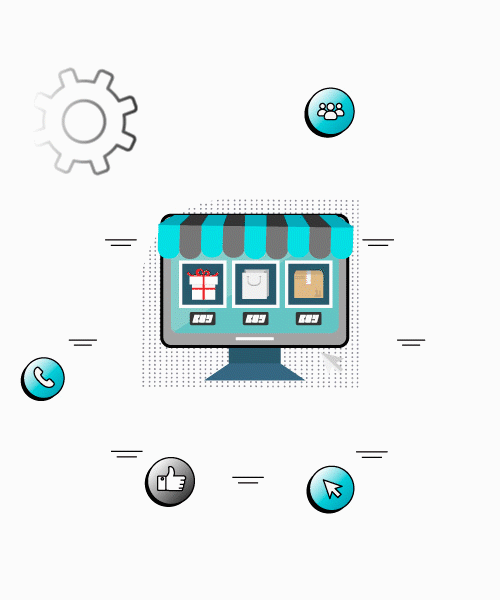
Here are some of the key reasons why businesses of all sizes choose Magento for their eCommerce platform:
Powerful and flexible
Magento is a feature-rich platform that offers merchants a wide range of functionality to create and manage successful online stores. It is highly customizable and extensible, allowing merchants to create a store that perfectly meets their unique needs.
Scalable
Magento is a highly scalable platform that can grow with your business. It can handle millions of products and orders without sacrificing performance. This makes it a good choice for businesses of all sizes, from small businesses to large enterprises.
Secure and reliable
Magento is a secure and reliable platform. It is PCI compliant and includes a variety of security features to protect your customers’ data. Magento is also highly stable and uptime is excellent.
Large community of developers and users
Magento has a large and active community of developers and users. This means that there are a vast number of resources available to help you with your Magento store, including extensions, themes, and support.
Top Magento eCommerce Trends 2023-24
Some of the key Magento eCommerce trends that are shaping the future of Magento eCommerce development:
Headless commerce
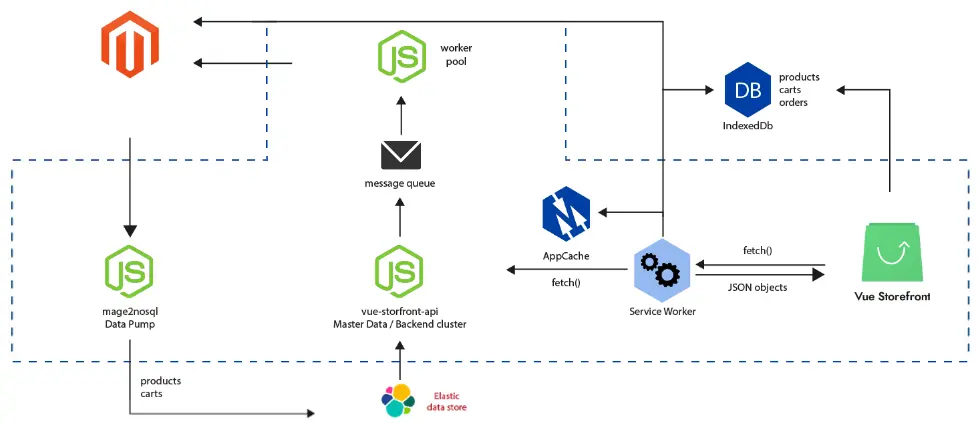
Headless commerce is a new approach to eCommerce architecture that decouples the front-end presentation layer from the back-end commerce platform. This gives businesses more flexibility to create custom shopping experiences and integrate with other systems.
With headless commerce, the front-end of the eCommerce store can be built using any technology stack, while the back-end commerce platform handles things like product management, order management, and payment processing. This gives businesses the freedom to create a shopping experience that is perfectly tailored to their unique needs and brand identity.
Headless commerce is also a good fit for businesses that want to integrate their eCommerce store with other systems, such as CRM systems, ERP systems, and marketing automation platforms. With headless commerce, businesses can create a unified customer experience across all of their channels.
Voice commerce

Voice commerce is a growing Magento eCommerce trend that allows customers to shop online using their voice assistants, such as Amazon Alexa or Google Assistant. Consequently, voice commerce is convenient for customers, and it can also help businesses to increase sales.
Magento supports voice commerce through its integration with Amazon Alexa. This integration allows Magento merchants to create voice apps that customers can use to shop in their stores.
Progressive Web Applications (PWAs)
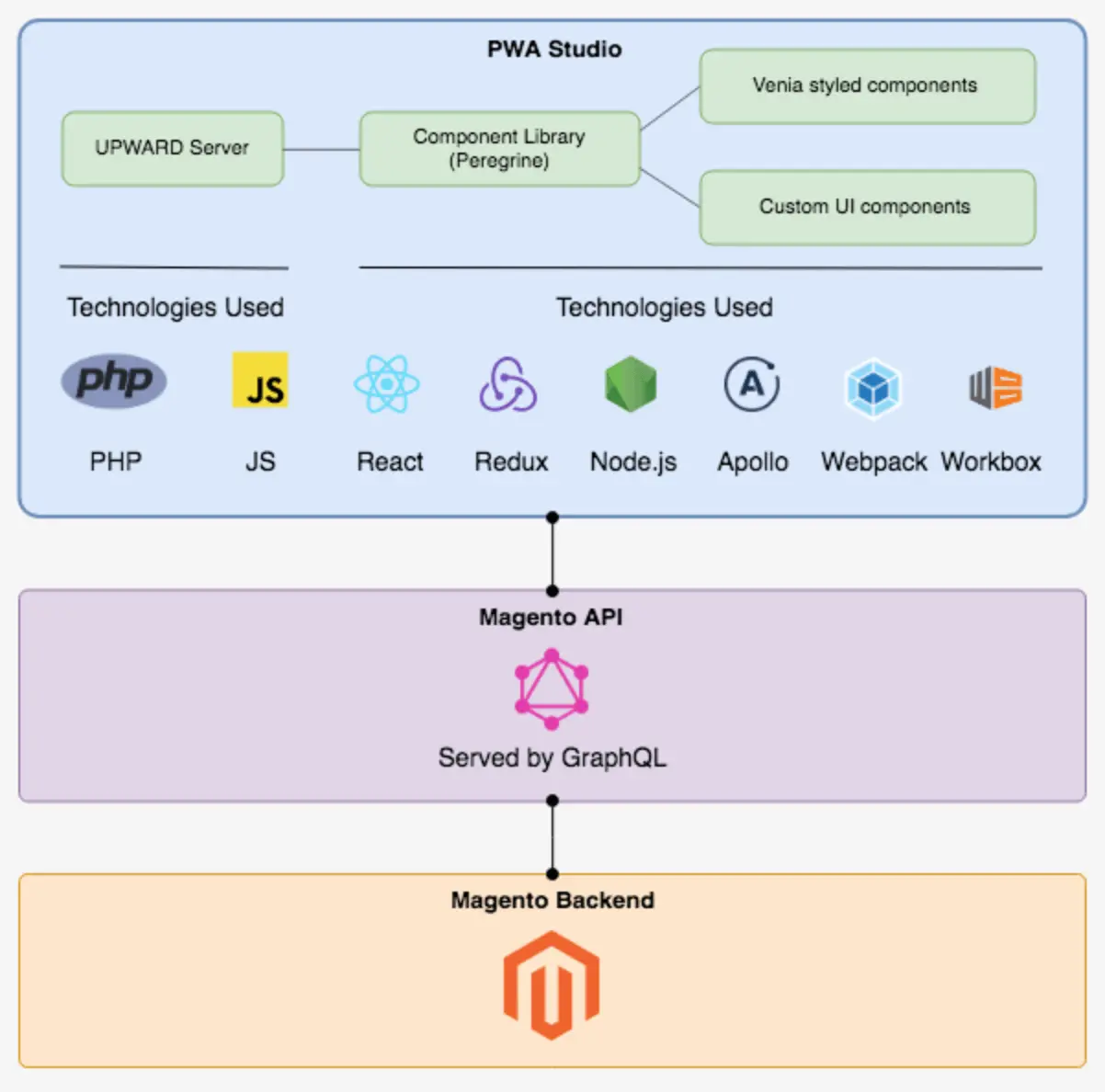
Progressive Web Applications (PWAs) are hybrid web applications that combine the best of the web and mobile apps. PWAs are fast, reliable, and engaging, and they can be installed on mobile devices like native apps.
PWAs are a good choice for Magento merchants because they offer a number of advantages over traditional web apps, including:
- Faster loading times
- Improved performance
- Better user experience
- Increased engagement
Magento supports PWAs through its Magento PWA Studio. This tool makes it easy for Magento merchants to create and deploy PWAs.
Omni-Channel Integration
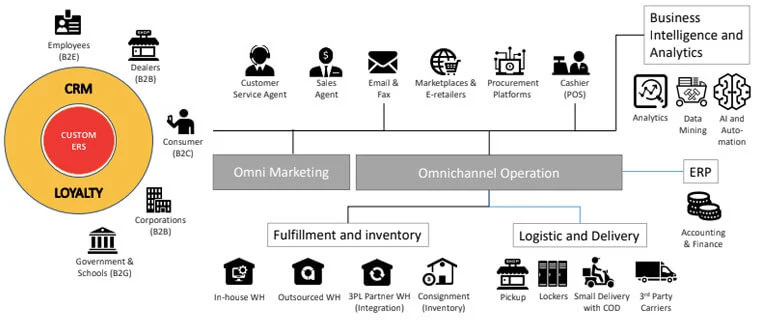
Omni-channel integration is the seamless integration of all channels through which a customer interacts with a business, including online, offline, and mobile. What’s more, Omni-channel integration provides customers with a consistent experience across all channels.
Magento supports omni-channel integration through its built-in order management system and its integrations with third-party systems, such as CRM systems and POS systems. With Magento, businesses can create a unified customer experience that spans all of their channels.
Artificial Intelligence and Machine Learning

Artificial intelligence (AI) and machine learning (ML) are technologies that can be used to automate tasks, personalize the shopping experience, and improve security in eCommerce.
Magento supports AI and ML through its Magento AI and ML Toolkit. This toolkit provides Magento merchants with access to a number of AI and ML features, such as:
- Product recommendations
- Fraud detection
- Personalized search results
- Chatbots
Augmented Reality and Virtual Reality

Augmented reality (AR) and virtual reality (VR) are technologies that can be used to create immersive shopping experiences that allow customers to visualize products in a realistic 3D environment.
Magento supports AR and VR through its integrations with third-party platforms. With Magento, businesses can create AR and VR experiences that allow customers to try on clothes, see furniture in their homes, and more.
What does the future hold for Magento eCommerce development?
Magento is a leading open-source eCommerce platform that is constantly evolving to meet the needs of businesses of all sizes. With its powerful features, flexible architecture, and large community of developers, Magento is well-positioned for continued growth and success.
In the coming years, we can expect to see Magento continue to innovate and embrace new technologies such as AI, ML, and AR to provide businesses with even more powerful and versatile tools to succeed. We can also expect to see Magento expand its commerce capabilities to meet the needs of an even wider range of business models and industry verticals.
Magento 2 as the Foundation
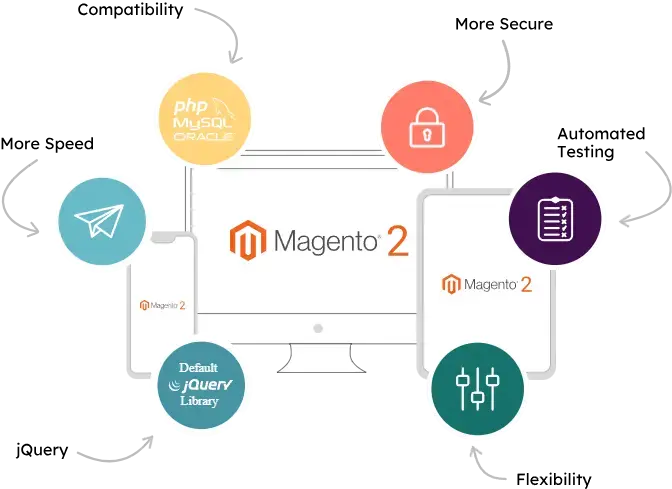
Magento 2 is the latest version of the Magento platform, and it is the foundation for the future of Magento eCommerce development. Moreover, Magento 2 is more powerful, flexible, and scalable than previous versions of the platform. It also includes a number of new features and enhancements, such as:
- A new GraphQL API that provides developers with more flexibility and control
- A new PWA Studio that makes it easy to create and deploy progressive web apps (PWAs)
- A new AI and ML Toolkit that provides merchants with access to AI and ML features such as product recommendations and fraud detection
- Improved performance and scalability
- Enhanced security
Magento is committed to Magento 2, and all future Magento development trends will be focused on this platform.
Continued Innovation and Feature Enhancements
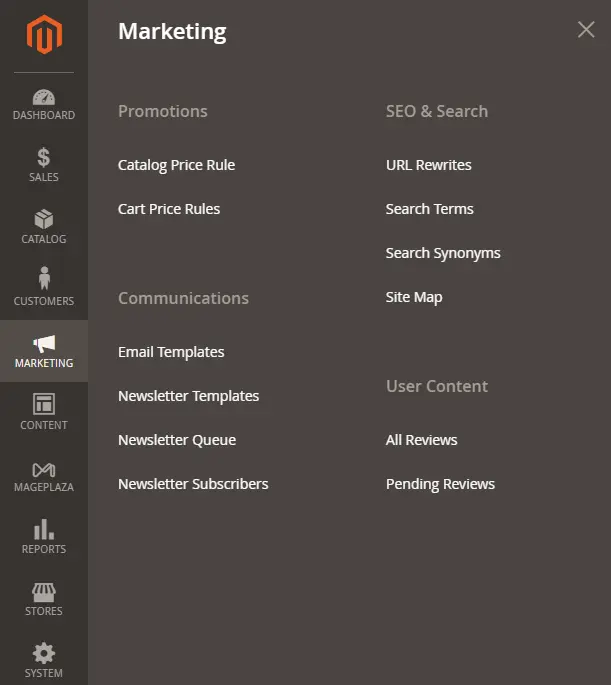
Magento is constantly innovating and adding new features and enhancements to the platform. This is driven by a number of factors, including feedback from the Magento community, emerging Magento eCommerce trends in the eCommerce industry, and new technologies that become available.
Some of the features and enhancements that Magento is currently working on include:
- Improved support for headless commerce
- More integrations with third-party systems
- Enhanced personalization capabilities
- More advanced reporting and analytics tools
Magento’s commitment to continuous innovation ensures that the platform remains at the forefront of eCommerce technology and helps businesses to meet the ever-changing needs of their customers.
Embracing New Technologies
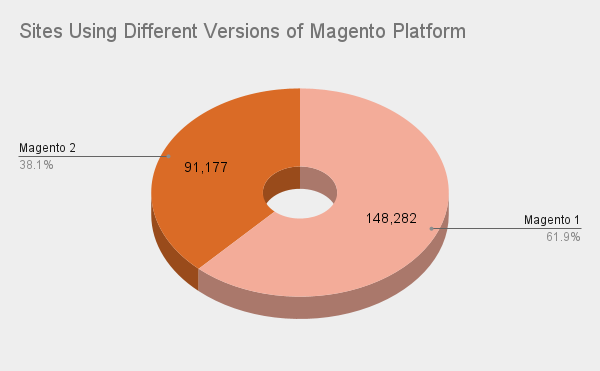
Magento is embracing new technologies such as AI, ML, and AR to provide businesses with cutting-edge solutions to improve the shopping experience and automate tasks.
For example, Magento’s AI and ML Toolkit provides merchants with access to features such as product recommendations, fraud detection, and personalized search results. Magento also supports AR and VR, which can be used to create immersive shopping experiences that allow customers to try on clothes, see furniture in their homes, and more.
By embracing new technologies, Magento is helping businesses to stay ahead of the competition and provide their customers with the best possible shopping experience.
Expansion of Commerce Capabilities
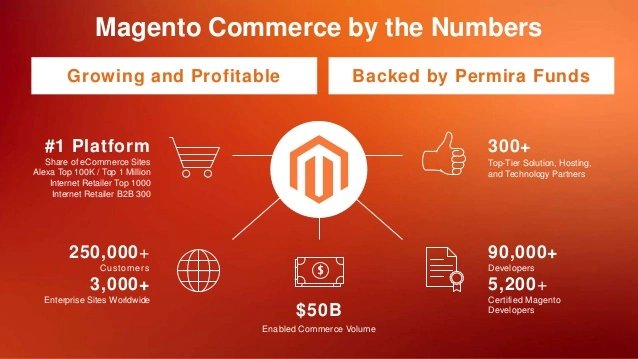
Magento is expanding its commerce capabilities to meet the needs of different business models and industry verticals. With professional Magento B2B development, companies can create customized solutions that support complex requirements like bulk orders, custom pricing, and multi-channel integration. This is making it a more versatile platform for businesses of all sizes.
For example, Magento is now offering solutions for B2B eCommerce, subscription commerce, and marketplace businesses. Magento is also expanding its support for industry-specific verticals such as fashion, food and beverage, and healthcare.
By expanding its commerce capabilities, Magento is making it possible for more businesses to use the platform to achieve their eCommerce goals.
Overall, the future of Magento is bright. Magento is committed to providing businesses with the most powerful, flexible, and innovative eCommerce platform available. By embracing new technologies and expanding its commerce capabilities, Magento is helping businesses to stay ahead of the competition and provide their customers with the best possible shopping experience.
What is the Magento HubSpot integration?
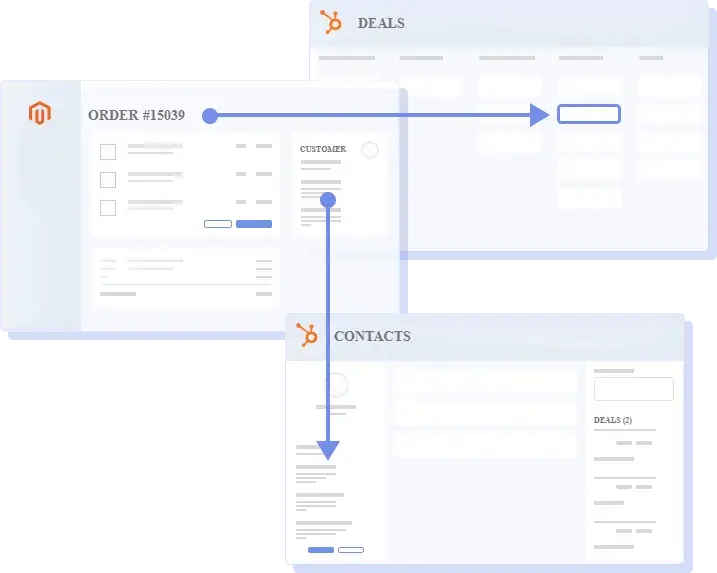
The Magento HubSpot integration is a powerful tool that allows businesses to connect their Magento eCommerce store to their HubSpot CRM platform.
This integration syncs customer data, order data, and other important information between the two platforms, giving businesses a holistic view of their customers and their interactions with their business.
Before we move on to the benefits, here are the Best Magento CRM Integrations for an eCommerce store!
Some of the benefits of the Magento HubSpot integration include:
- Improved customer segmentation and targeting: With a complete view of their customers’ purchase history, product interests, and other data, businesses can use HubSpot to create more targeted and effective marketing campaigns.
- Automated customer nurture workflows: HubSpot’s powerful automation tools can be used to create personalized customer nurture workflows that automatically send emails, texts, and other messages to customers based on their behavior and interests.
- Increased sales and conversions: By better understanding their customers and their needs, businesses can use the Magento HubSpot integration to increase sales and conversions.
How MakeWebBetter helps with the HubSpot Magento integration
Are you looking for a way to connect your Magento eCommerce store to your HubSpot CRM platform?
MakeWebBetter’s Magento HubSpot Integration is the easy way to do it.
With our integration, you can sync your customer data, order data, and other important information between Magento and HubSpot.
This will give you a holistic view of your customers and their interactions with your business, which will help you to improve your marketing and sales efforts.
MakeWebBetter’s HubSpot Magento Integration is easy to install and use. It’s also highly affordable and comes with a variety of features and functionality to help you match up with the latest Magento eCommerce trends.
So, if you’re ready to take your marketing and sales to the next level and step up to the latest Magento eCommerce trends, sign up for MakeWebBetter’s HubSpot Magento Integration today.
And while you’re at it, do check out our HubSpot Magento field mapping add-on!
With that, you can easily map your Magento customer fields with respective HubSpot contact properties to ensure your customers’ data store into the right properties.
Don’t forget to get the add-on for smoother Magento management.
Or, if you’re in the mood for some DIY, then here is a Step-by-step Guide To Connect Magento To HubSpot!
Conclusion
In conclusion, Magento is a powerful and versatile eCommerce platform that is constantly evolving to meet the needs of businesses of all sizes.
Moreover, with its commitment to innovation, Magento eCommerce trends are well-positioned to remain at the forefront of the eCommerce industry.
By embracing these Magento eCommerce trends, merchants can improve the customer experience, increase sales, and stay ahead of the competition.
Above all, by staying up-to-date on the latest Magento eCommerce trends and developments, merchants can ensure that their online stores are successful for many years to come.
Hop onto the latest Magento eCommerce trends today!
Our Magento experts guarantee the best know-how of the platform.


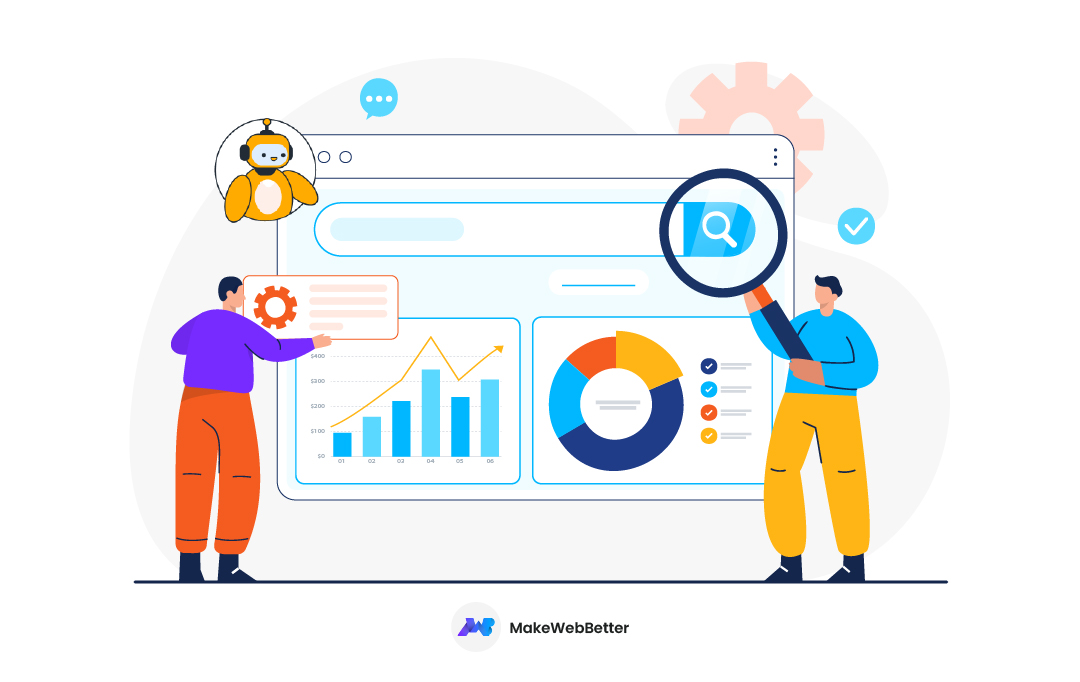
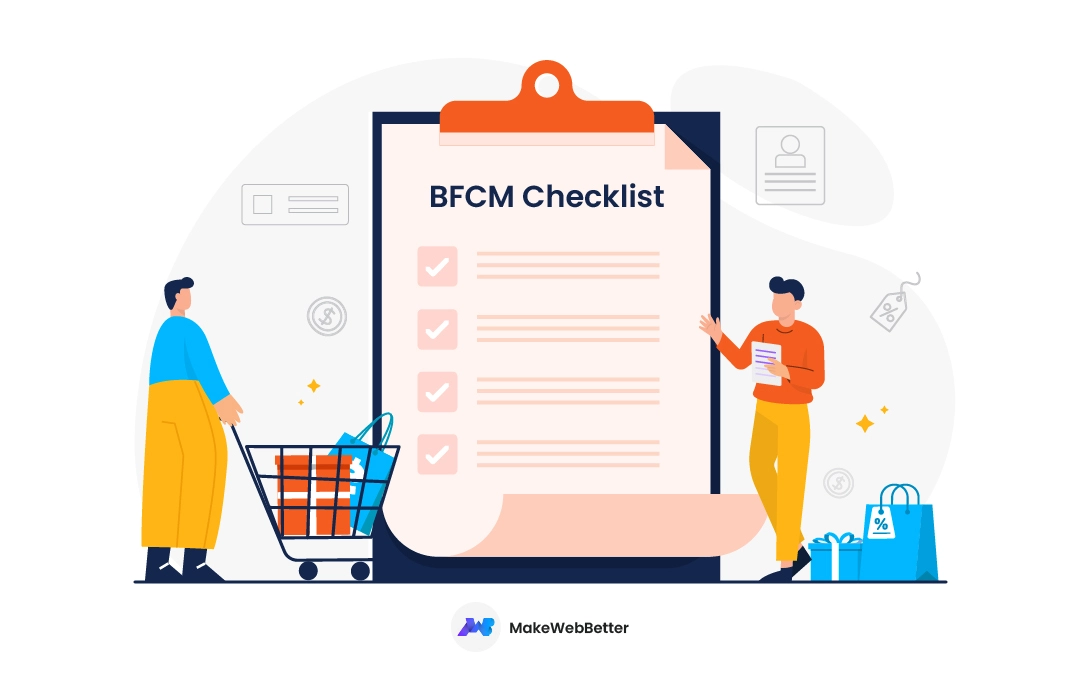







This article offers a fantastic overview of Magento e-commerce trends to watch in 2024! It’s exciting to see the focus on AI integration, personalization, and PWA technology shaping the future of Magento stores. Staying ahead with these trends can really enhance customer experience and drive engagement. For businesses ready to implement these trends, SMB Tech Solution provides specialized Magento services, including AI-driven solutions, PWA development, and custom integrations. With the right support, adapting to these trends can significantly boost a store’s competitive edge. Thanks for sharing these insights—it’s a must-read for anyone invested in e-commerce growth!
Thanks for sharing this comprehensive guide. With Magento’s recent updates, it’s good to know what we should prioritize. Looking forward to implementing these trends in our eCommerce strategy!